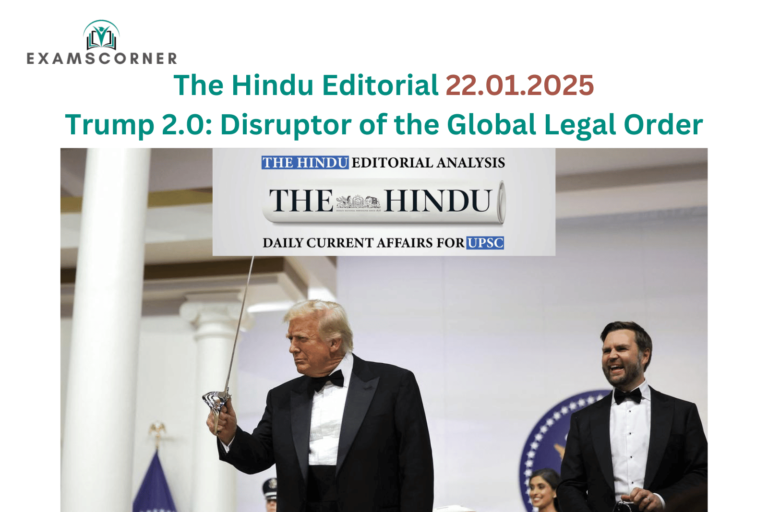Donald Trump’s return to the presidency heralds the start of a new era in global politics—one that promises to challenge the international legal order in unprecedented ways. With renewed control over the U.S. Senate and the House, Trump is expected to push forward his agenda with greater vigor, reshaping global norms and institutions. This article explores the anticipated disruptions and their implications for the world.
The U.S. and Its Complex Relationship with International Law
Foundational Role in International Law
The United States has long played a pivotal role in establishing and shaping international law. It has been instrumental in creating key institutions and frameworks governing areas such as:
- Climate change
- Space law
- Human rights
- Trade and investment
Policy of Exceptionalism
Despite its leadership in shaping global norms, the U.S. has often pursued a policy of exceptionalism, positioning itself as an exception to the very rules it expects others to follow. This dual approach has drawn criticism for undermining the legitimacy of international law.
Trump 1.0: A Radical Shift
Sovereigntist View of International Law
During his first term, Trump adopted what scholars Oona Hathaway and Scott Shapiro term a ‘sovereigntist’ perspective, which views multilateral treaties as constraints on national sovereignty. This was reflected in his skepticism toward multilateralism and a preference for bilateral agreements.
Key Actions Undermining International Commitments
- Paris Agreement Withdrawal: Trump withdrew the U.S. from the Paris Climate Accord in 2017.
- Abandonment of Nuclear Treaties: His administration exited key nuclear agreements with Russia and Iran.
- Challenges to Trade Regimes: By imposing tariffs and blocking appointments to the World Trade Organization’s (WTO) Appellate Body, Trump disrupted global trade norms.
- Withdrawal from Multilateral Institutions: The U.S. left UNESCO, attempted to exit the World Health Organization (WHO), and threatened to withdraw from the WTO.
The Return of Trump: A New Onslaught
Weakening Multilateral Institutions
Trump’s second term is expected to further erode the authority of multilateral organizations. Despite efforts by the Biden administration to re-engage with these institutions, Trump’s policies could undo much of this progress. His reported plans include withdrawing from the WHO and the Paris Agreement once again.
Unilateralism and Protectionism
Trump has announced intentions to raise tariffs, including a potential 25% tariff on imports from Mexico and Canada, even if it violates WTO rules. His disdain for the Washington Consensus-based trade and investment model will likely intensify.
Implications for the Global South
Hopes for reviving the WTO’s Appellate Body, a key aspiration for the Global South, seem bleak under Trump’s leadership. This could further marginalize developing nations in the global economic system.
Aggressive Territorial Ambitions
Annexation Proposals
Trump has floated controversial plans to annex Greenland and the Panama Canal, and has even suggested making Canada the 51st U.S. state. Such ambitions harken back to the imperialistic practices of the 18th and 19th centuries.
Implications for International Norms
These proposals challenge post-UN Charter norms, which prioritize the prohibition of force and the principle of self-determination. They could embolden revisionist powers like China and Russia to pursue similar goals, undermining global stability.
Norm Violations
Statements and actions by Trump and his allies, including Elon Musk’s comments on the internal affairs of countries like the U.K. and Germany, could violate principles of non-intervention under Article 2(7) of the UN Charter.
Preserving the International Legal Order
International legal scholar Harold Koh has noted that many of Trump’s disruptive policies were tempered during his first term by resistance from participants in the ‘transnational legal process,’ including U.S. officials. However, with a strengthened majority in Congress, Trump’s ability to implement his agenda more effectively is likely.
To counteract these challenges, other nations must unite to uphold the international legal order. Cooperation among countries will be essential to mitigate the potential damage to global norms and institutions.
Conclusion
Donald Trump’s second term as U.S. President is set to intensify the disruption of the global legal order. From weakening multilateral institutions to pursuing aggressive territorial ambitions, his policies could have far-reaching implications for international law and global stability. The world’s nations must collaborate to safeguard the principles and institutions that underpin the international legal system.



